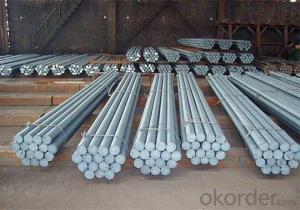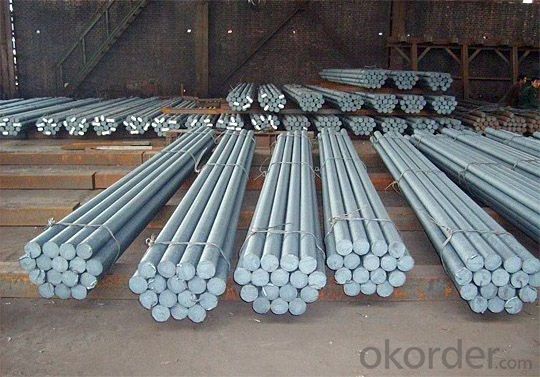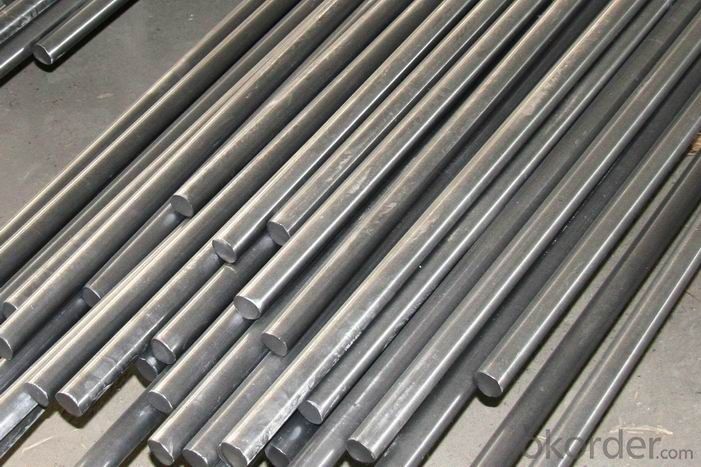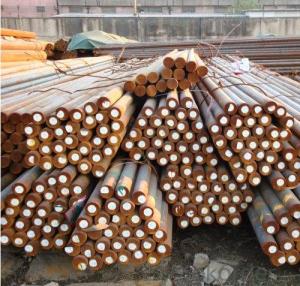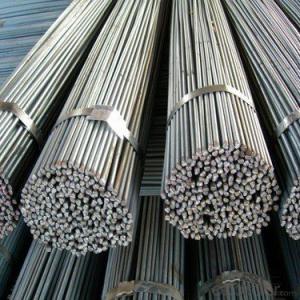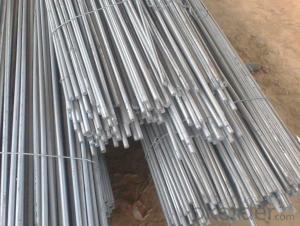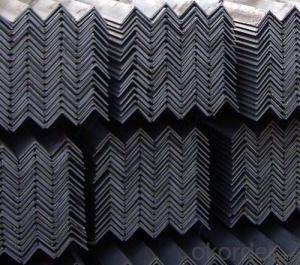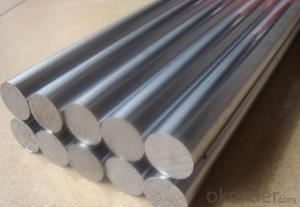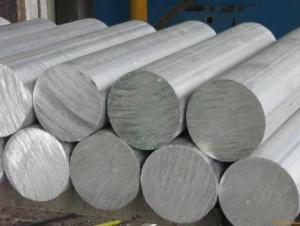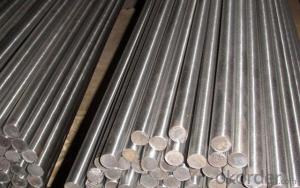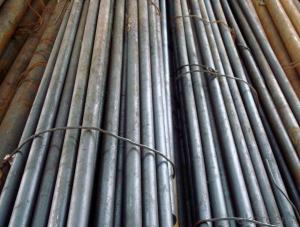Hot Rolled Spring Steel Round Bar 30mm with High Quality
- Loading Port:
- Shanghai
- Payment Terms:
- TT or LC
- Min Order Qty:
- 20 m.t.
- Supply Capability:
- 500 m.t./month
OKorder Service Pledge
OKorder Financial Service
You Might Also Like
Product Description:
OKorder is offering Hot Rolled Spring Steel Round Bar 30mm with High Quality at great prices with worldwide shipping. Our supplier is a world-class manufacturer of steel, with our products utilized the world over. OKorder annually supplies products to European, North American and Asian markets. We provide quotations within 24 hours of receiving an inquiry and guarantee competitive prices.
Product Applications:
Hot Rolled Spring Steel Round Bar 30mm with High Quality is widely used to make the bearing used in automobile, tractor engine, transmission and the wheel. And it also used to make the main bearing for the machine tools, electrical machinery, mining machinery, electric locomotives,mechanical ventilation and high speed of grinding wheel spindle etc
Product Advantages:
OKorder's Hot Rolled Spring Steel Round Bar 30mm with High Quality are durable, diversified and qualified.
Main Product Features:
· Premium quality
· Prompt delivery & seaworthy packing (30 days after receiving deposit)
· Can be recycled and reused
· Mill test certification
· Professional Service
· Competitive pricing
Product Specifications:
Manufacture: Hot rolled
Grade: 20CrNiMoA 20CrNi2MoA 16Cr2Ni4MoA 12Cr2Ni3Mo5A 20Cr2Ni4A 20Cr2Ni2MoA
Cr4Mo4V Cr15Mo4 W9Cr4V2Mo W18Cr4V W6Mo5Cr4V2 5CrMnMo 60CrMnMoNi 37CrA 55SiMoVA etc
Certificates: ISO, SGS, BV, CIQ
Length:6m 8m 9m 12m
Packaging: Packed in bundles with standard export sea-worthy package or as customer require
FAQ:
Q1: Why buy Materials & Equipment from OKorder.com?
A1: All products offered byOKorder.com are carefully selected from China's most reliable manufacturing enterprises. Through its ISO certifications, OKorder.com adheres to the highest standards and a commitment to supply chain safety and customer satisfaction.
Q2: How do we guarantee the quality of our products?
A2: We have established an advanced quality management system which conducts strict quality tests at every step, from raw materials to the final product. At the same time, we provide extensive follow-up service assurances as required.
Q3: How soon can we receive the product after purchase?
A3: Within three days of placing an order, we will begin production. The specific shipping date is dependent upon international and government factors, but is typically 7 to 10 workdays.
Q4: How many types of bearing steel that OKorder.com can supply?
A4: Two types, carbon spring steel and alloy spring steel
Images:
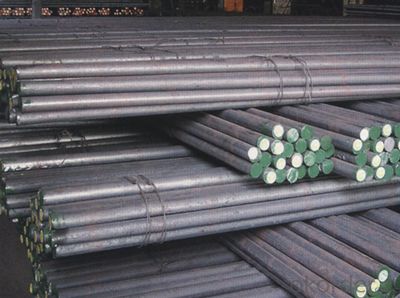
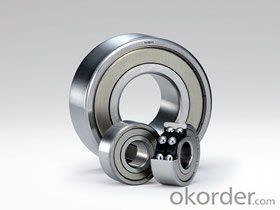
- Q: How are tool steels used in the manufacturing of cutting tools?
- Tool steels are used in the manufacturing of cutting tools due to their high hardness, wear resistance, and ability to withstand high temperatures. They are typically used to create the blades or edges of cutting tools such as drills, saws, and knives. Tool steels allow for precise and efficient cutting by maintaining their sharpness for longer durations, providing durability and strength to the cutting tools.
- Q: How does special steel contribute to the creep resistance of products?
- Special steel contributes to the creep resistance of products through its unique properties and composition. Creep is the gradual deformation of a material under constant stress over time, and it is a critical concern in industries that require high temperatures and prolonged usage. Special steel, also known as high-temperature steel or heat-resistant steel, is specifically designed to withstand these extreme conditions and minimize creep. One of the key factors contributing to the creep resistance of special steel is its high melting point. Special steel is typically alloyed with elements such as chromium, nickel, molybdenum, and vanadium, which significantly increase its melting point compared to ordinary steel. This enhanced heat resistance allows special steel to maintain its structural integrity and resist deformation even at elevated temperatures. Moreover, the unique microstructure of special steel plays a crucial role in its creep resistance. Special steel is engineered to have a fine-grained structure, which improves its strength and prevents the movement of dislocations within the material. Dislocations are defects in the atomic arrangement of a material that can lead to creep deformation. By minimizing the movement of dislocations, special steel exhibits higher resistance to creep and maintains its shape and dimensional stability over extended periods. In addition to its microstructure, special steel often has a higher content of certain alloying elements. For instance, the addition of elements like molybdenum and vanadium enhances the creep strength of special steel by forming stable carbides within the material. These carbides act as barriers to dislocation movement, further impeding creep deformation and improving the overall creep resistance of the product. Furthermore, special steel is often subjected to advanced heat treatment processes, such as quenching and tempering, to optimize its mechanical properties and enhance its creep resistance. These heat treatments help to refine the microstructure, improve the distribution of alloying elements, and increase the hardness and strength of the material, all of which contribute to better resistance against creep. Overall, special steel's ability to withstand high temperatures, its unique microstructure, and its alloying elements and heat treatment processes combine to provide exceptional creep resistance. This makes special steel an ideal choice for various applications that require durability and longevity under extreme thermal conditions, such as gas turbines, nuclear reactors, high-temperature boilers, and aerospace components.
- Q: What are the cost considerations when using special steel?
- When using special steel, there are several cost considerations that need to be taken into account. Firstly, the cost of the raw materials used to produce special steel can be significantly higher compared to regular steel. Special steel is often made from alloying elements such as chromium, nickel, or molybdenum, which can be more expensive than the iron and carbon used in regular steel production. These alloying elements improve the properties of the steel, making it stronger, more corrosion-resistant, or better suited for specific applications. Additionally, the production process for special steel may involve additional steps or specialized equipment, leading to increased manufacturing costs. This can include steps such as vacuum degassing, controlled cooling, or precision forging, all of which contribute to the quality and performance of the final product but can also add to the overall cost. Furthermore, because special steel is often tailored to meet specific requirements or industry standards, there may be additional testing and certification costs involved. These can include non-destructive testing, material analysis, or third-party inspections to ensure that the steel meets the required specifications. These additional quality control measures can add to the overall cost of using special steel. Finally, the demand and availability of special steel can also impact its cost. If the demand for certain types of special steel is high or the supply is limited, prices may be driven up. This can be particularly relevant for industries that require specialized steel grades, such as aerospace, automotive, or oil and gas. In summary, the cost considerations when using special steel include the higher cost of raw materials, the additional manufacturing steps, the testing and certification requirements, and the overall supply and demand dynamics of the market. However, it is important to note that the benefits and advantages of using special steel, such as improved performance, durability, or specific properties, can often outweigh the higher costs, making it a worthwhile investment for many industries.
- Q: How does nitriding steel improve hardness and wear resistance?
- Nitriding steel improves hardness and wear resistance by introducing nitrogen into the surface of the material. This process forms nitrides, which are hard compounds that increase the surface hardness of the steel. Additionally, the nitrides create a protective layer that enhances the material's resistance to wear, erosion, and corrosion.
- Q: How does special steel contribute to the defense sector?
- Special steel plays a crucial role in the defense sector by providing various benefits and applications that enhance national security. Firstly, special steel is known for its superior strength, durability, and resistance to wear and corrosion. These properties make it an ideal material for the production of military equipment and weaponry. Special steel is used in the manufacturing of tanks, armored vehicles, naval ships, and aircraft carriers, ensuring their structural integrity and protection against enemy attacks. Additionally, the use of special steel in the construction of ballistic armor and bulletproof vests enhances the safety of soldiers on the battlefield. Moreover, special steel alloys offer excellent thermal resistance and high-temperature capabilities, making them suitable for the production of jet engines, turbines, and rocket components. These materials can withstand extreme conditions, enabling faster and more efficient military aircraft, missiles, and space exploration vehicles. Furthermore, special steel is used in the defense sector for its electromagnetic properties. It is employed in the development of radar systems, communication devices, and electronic warfare equipment. Special steel alloys can effectively shield against electromagnetic interference, ensuring secure and reliable communication in critical defense operations. Additionally, special steel plays a vital role in the production of precision tools and machinery used in the defense sector. It offers high machinability, allowing for the fabrication of complex components with tight tolerances. Special steel is used in the manufacturing of military-grade cutting tools, drills, and machine parts, enhancing the efficiency and effectiveness of military operations. In summary, special steel contributes significantly to the defense sector by providing strength, durability, resistance, and various other crucial properties. Its applications in military equipment, weaponry, armored vehicles, aircraft, and electronic systems enhance national security, protect soldiers, and enable advanced defense capabilities.
- Q: How does special steel contribute to the strength of structures?
- Special steel contributes to the strength of structures through its unique properties and composition. It is specifically engineered to have higher tensile strength, durability, and resistance to corrosion compared to regular steel. Its increased strength allows structures to withstand heavier loads, vibrations, and extreme weather conditions more effectively, ensuring their stability and longevity. Additionally, the use of special steel enables the construction of lighter and more streamlined structures, as thinner sections can be used without compromising their strength. Overall, special steel plays a vital role in enhancing the structural integrity and safety of various buildings, bridges, and infrastructure projects.
- Q: How does special steel perform in nuclear applications?
- Special steel is highly valued in nuclear applications due to its exceptional properties and performance. Nuclear reactors operate under extreme conditions, including high temperatures, high pressures, and exposure to radiation. Special steel, also known as nuclear-grade steel or reactor-grade steel, is specifically designed to withstand these demanding conditions. One of the key characteristics of special steel is its excellent strength and toughness. This allows it to resist deformation and fracture even under the intense stress and pressure found in nuclear reactors. Special steel also exhibits superior heat resistance, enabling it to maintain its structural integrity at elevated temperatures. This is crucial for preventing any potential failures or structural damage that could jeopardize the safety and efficiency of the nuclear system. Furthermore, special steel possesses remarkable resistance to corrosion and oxidation. Nuclear reactors contain highly corrosive environments due to the presence of various chemical compounds and high-temperature water or steam. The corrosion resistance of special steel ensures the longevity and reliability of the reactor components, while also minimizing the risk of radioactive material release. In addition, special steel is designed to have low neutron absorption properties. Neutron absorption can lead to the formation of unwanted isotopes, which could interfere with the nuclear reactions or contribute to the production of radioactive waste. By reducing neutron absorption, special steel helps to optimize the performance and efficiency of the nuclear system. Overall, special steel is a critical material in nuclear applications as it provides the necessary strength, heat resistance, corrosion resistance, and low neutron absorption required for safe and efficient operation of nuclear reactors. Its exceptional performance ensures the integrity of the system, minimizes the risk of accidents, and contributes to the overall sustainability of nuclear energy.
- Q: How does special steel contribute to electrical conductivity?
- Special steel, also known as electrical steel or silicon steel, plays a crucial role in enhancing electrical conductivity. This type of steel is specifically designed to minimize the electrical losses that occur during the transmission and distribution of electrical power. It achieves this by reducing the eddy current losses and hysteresis losses that arise when an alternating current (AC) flows through a magnetic material. One of the main factors that make special steel highly conductive is its chemical composition. It is alloyed with specific elements such as silicon, which improves its magnetic properties and reduces its electrical resistance. The addition of silicon increases the electrical resistivity of the steel, making it more suitable for applications that require low energy loss and efficient electrical conduction. Moreover, special steel is manufactured with a carefully controlled grain structure, which aligns the crystals in the material in a specific orientation. This alignment, known as grain-oriented, allows the steel to exhibit superior magnetic properties, making it highly efficient in conducting electrical currents. It also reduces the magnetic losses that occur when the magnetic field changes direction, further enhancing the overall electrical conductivity. The unique properties of special steel make it an ideal choice for various electrical applications, such as transformer cores, electric motors, generators, and other electromagnetic devices. Its high electrical conductivity ensures minimal energy loss during the transmission and distribution of electricity, ultimately leading to more efficient and cost-effective electrical systems. In summary, special steel significantly contributes to electrical conductivity by minimizing electrical losses through its specific chemical composition and grain structure. Its low electrical resistance and superior magnetic properties make it an essential material for optimizing energy efficiency in electrical systems.
- Q: How is special steel used in the aerospace supply chain?
- Special steel is used in the aerospace supply chain for various critical applications. It is primarily used for manufacturing aircraft components such as engine parts, landing gears, and structural components. The high strength, durability, and corrosion resistance of special steel make it ideal for withstanding the demanding conditions and extreme temperatures experienced during flight. Additionally, special steel's unique properties allow for lightweight designs, improving fuel efficiency and overall aircraft performance.
- Q: What are the different applications of stainless special steel?
- Stainless special steel, which is also known as stainless steel, is a highly versatile material that is used in various industries because of its unique properties. Some examples of the different ways in which stainless special steel is utilized include: 1. Construction: Stainless steel is widely employed in the construction industry due to its exceptional durability and resistance to corrosion. It is used in structural components, bridges, building facades, and roofing materials. 2. Automotive industry: The automotive sector extensively utilizes stainless steel because of its strength, ability to withstand high temperatures, and durability. It can be found in exhaust systems, mufflers, catalytic converters, fuel tanks, and various other components. 3. Medical equipment: Stainless steel is the preferred material in the medical field because of its high resistance to corrosion and biocompatibility. It is used in the production of surgical instruments, implants, orthopedic devices, and medical equipment. 4. Food processing industry: Stainless steel is widely employed in the food industry because of its hygienic properties. It is used in the manufacturing of food processing equipment, storage tanks, food preparation surfaces, and utensils. 5. Aerospace industry: Stainless steel is utilized in the aerospace industry for its strength, ability to withstand high temperatures, and resistance to corrosion. It is used in the production of aircraft parts, engine components, and structural elements. 6. Chemical industry: Stainless steel is highly resistant to corrosion from various chemicals, making it suitable for applications in the chemical industry. It is used in the manufacturing of tanks, pipes, valves, and other equipment that come into contact with corrosive substances. 7. Energy sector: Stainless steel is used in the energy industry for various purposes. It is employed in the construction of power plants, oil and gas refineries, pipelines, and renewable energy systems such as wind turbines and solar panels. 8. Marine industry: Stainless steel is extensively used in marine environments because of its excellent resistance to corrosion. It is used in the production of boat fittings, propellers, underwater structures, and offshore platforms. 9. Household appliances: Stainless steel is commonly used in household appliances because of its attractive appearance, durability, and resistance to stains and scratches. It can be found in kitchen appliances such as refrigerators, ovens, dishwashers, and washing machines. 10. Art and design: Stainless steel is increasingly being employed in art installations, sculptures, and architectural designs because of its aesthetic appeal, versatility, and ability to withstand outdoor conditions. In conclusion, stainless special steel is utilized in a wide range of industries due to its durability, resistance to corrosion, strength, ability to withstand high temperatures, and aesthetic appeal. It plays a crucial role in construction, automotive, medical, food processing, aerospace, chemical, energy, marine, household appliances, and artistic fields.
Send your message to us
Hot Rolled Spring Steel Round Bar 30mm with High Quality
- Loading Port:
- Shanghai
- Payment Terms:
- TT or LC
- Min Order Qty:
- 20 m.t.
- Supply Capability:
- 500 m.t./month
OKorder Service Pledge
OKorder Financial Service
Similar products
Hot products
Hot Searches
Related keywords
